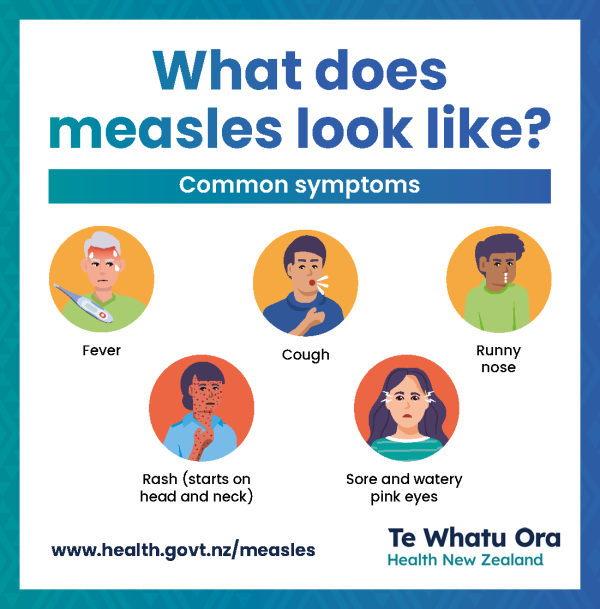A person in Tāmaki Makaurau has been confirmed with measles after recent overseas travel.
Measles is a very serious illness that spreads very quickly among people who aren’t immune.
National Public Health Service is working closely with the Auckland City Hospital team to identify people who may have come into contact with the individual in the adult emergency department for a short time, on the evening of 17 September, before the person was isolated from others.
National Public Health Service will be getting in touch with close contacts to give advice on immunity, vaccination and quarantine.
The person with measles also was in a Takanini bakery for around 15 minutes while infectious on Tuesday 12 September, but there is still a risk of infection for anyone there up to an hour afterwards.
Members of the public who were at Bake & Beans, 108 Great South Road, Takanini between 5.15 to 6.45 pm should watch for symptoms.
If you have measles symptoms, phone your GP or Healthline (0800 611 116) for advice first. Seek urgent medical advice if they have difficulty breathing, by calling 111.
The measles virus() is so infectious that if you’re not vaccinated and come into contact with someone who has measles, you’re very likely to catch it and pass it on to others.
Measles spreads through coughing and sneezing. It can cause a rash, ear infection, diarrhoea, and seizures caused by fever.
In 1 in every 1,000 cases, it causes inflammation of the brain (encephalitis). Some people who develop encephalitis die, while 1 in 3 are left with permanent brain damage.
Measles can also lead to pneumonia, which is the main cause of death from measles.
If you get measles while you’re pregnant it can make you very sick and can harm your baby.
During New Zealand’s last measles outbreak in 2019, 40% of children who caught measles were admitted to hospital.

Immunisation is the best protection against measles.
“Measles is a very serious illness that spreads very quickly amongst people who aren’t immune,” says Dr Lavinia Perumal, Northern Regional Public Health Clinical Director.
“We urge people to stay alert to symptoms of measles and ensure that children receive their normal vaccinations between 15 months and 4 years,“ she says.
Two MMR vaccines are free for anyone 18 years or under, and for New Zealand residents aged over 18 years. If you or anyone in your whānau born after 1969 has not had an MMR vaccine, or aren't sure, ask your GP, parent or caregiver.
It is important that people travelling overseas make sure they have had their MMR vaccinations if they were born after 1969 so they do not bring the virus back into the country.
← Back to the news